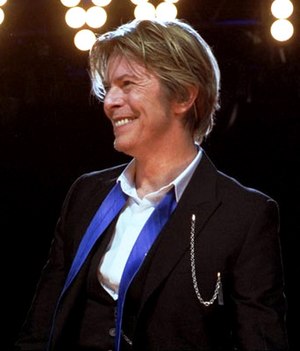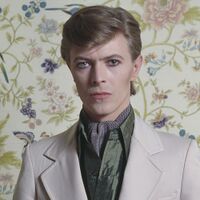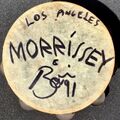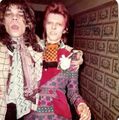David Bowie: Difference between revisions
(add categories) |
|||
| (44 intermediate revisions by 4 users not shown) | |||
| Line 1: | Line 1: | ||
[[Category:Influences on Morrissey - Music]] | [[Category:Influences on Morrissey - Music]] | ||
[[Category:Influenced by Morrissey / The Smiths]] | |||
[[Category:Covered Morrissey / The Smiths]] | [[Category:Covered Morrissey / The Smiths]] | ||
[[Category:Covered by Morrissey / The Smiths]] | [[Category:Covered by Morrissey / The Smiths]] | ||
[[File: | right | thumb | ]] | [[Category:Cover Star]] | ||
[[Category:Supported by Morrissey]] | |||
| | [[Category:Concert Backdrop]] | ||
| | [[File:David Bowie.jpg | 200px | right | thumb | David Bowie ]] | ||
| | == Relevance == | ||
| | Morrissey and Bowie's duet of "[[Mention::Cosmic Dancer]]" at [[Los Angeles, California 1991-06-02 (Morrissey concert)|The Forum in Los Angeles, CA (June 2, 1991)]] was [[Cosmic Dancer/That's Entertainment (single)|released in 2020]].<br> | ||
| | Morrissey covered "[[Drive-In Saturday]]" live in 2007.<br> | ||
| | Bowie covered "[[Covered Song::I Know It's Gonna Happen Someday]]" on his 1993 album "Black Tie White Noise". | ||
| | From [https://www.laweekly.com/moz-the-cat/ MOZ THE CAT - LA Weekly] (January 31, 2007): | ||
<blockquote> | |||
'''''The New York Dolls had a kind of — a weird kind of macho quality that T. Rex doesn’t have, or Bowie.'''''<br> | |||
No. Well, Bowie was very womanly. He was very womanly when he originally broke through in England, and it’s largely forgotten now. But if you can imagine him walking onto a British television screen in 1972, it was very, very shocking, very shocking. And it was unimaginable — absolutely unimaginable. And even though punk was a worldwide revolution and fantastically so, it wasn’t quite as threatening as, as you term it, glitter rock. | |||
</blockquote> | |||
From [https://www.rollingstone.com/music/music-features/morrissey-on-politics-david-bowie-what-his-fans-taught-him-201082/ "Morrissey on Politics, David Bowie, What His Fans Taught Him" - Rolling Stone] (Dec. 8, 2017): | |||
<blockquote> | |||
'''If David Bowie called on the cosmic telephone, what would you two talk about?'''<br> | |||
He called many times on the terrestrial telephone. He must surely be happy now. Music is eternity, and there he is, now, very much in it. I don’t imagine he wanted anything else from life. | |||
</blockquote> | |||
From [https://www.morrisseycentral.com/messagesfrommorrissey/turning-the-inside-out "Turning The Inside Out." - Morrissey Central] (July 5, 2021) | |||
<blockquote> | |||
'''SAM: I wasn't ever a Bowie fan, and I don't understand the hysteria for him.'''<br> | |||
M: Well, certainly in 1972, '73, '74 he looked incredible, and he was earth-threatening for that period, so, when you consider how he started with no advantages it's remarkable how a strong level of fantasy and vanity can give you so much strength, and he did it without giving anything whatsoever of his true self away. | |||
'''SAM: His true self? What do you mean?'''<br> | |||
M: Well, he was always laughing at something, or smiling at least, and never spoke about anything in depth. I'd say something not remotely funny and he'd burst out laughing. | |||
'''SAM: If he were alive now do you think you'd be friends?'''<br> | |||
M: I don't think he was friends with anybody. [[Mention::Lou Reed | Lou]] told me that David would pass him on the street and look the other way. He also said that David spent his final years in his apartment eating meatballs. But, God bless him. | |||
</blockquote> | |||
See also [http://passionsjustlikemine.com/influence-music.htm Under The Influence - Passions Just Like Mine] / David Bowie. Excerpts: | |||
<blockquote>His song "The Laughing Gnome" was played during intermission on the 1991 Kill Uncle tour. | |||
Morrissey accepted to support Bowie on his 1995 Outside Tour. He stayed on board for two weeks then pulled out. | |||
Morrissey, in the 2002 documentary "The Importance Of Being Morrissey": "He was a fascinating artist in 1970, 1971, 1972... but not now." | |||
In an interview to Radionica (Columbia) in early 2012, Morrissey mentioned David Bowie in a list of artists he was indebted to, and that he would like to sing "You've Lost That Lovin' Feeling" with him. He also said "David Bowie took me one night to his studio in New York and played a version of one of my songs. I cried for a week. Of anything for what I have prayed in my life, I never imagined that I would be given so much." | |||
The sleeve of the 2013 redesigned "The Last Of The Famous International Playboys" single was originally going to feature a previously unseen private photograph of David Bowie and Morrissey taken by Linder Sterling in New York in 1992. Although Bowie has no legal rights to the photograph, most of his back catalogue was at the time licensed to EMI so he successfully managed to order EMI UK not to run the proposed artwork. | |||
In his [[Mention::Autobiography]], Morrissey talks about buying Bowie's "Starman" single, seeing him live, and the effect the artist had on him when he was a teenager. He also discusses other meetings with his idol, singing a duet with him and having him cover one of his songs, etc. | |||
</blockquote> | |||
See also [https://torrhl.tumblr.com/post/137101013500/every-time-morrissey-mentions-david-bowie-in Every time Morrissey mentioned David Bowie in “Autobiography” - Torr]. Excerpt: | |||
<blockquote> | |||
I meet David Bowie for breakfast at a discreet restaurant at the foot of the Hollywood Hills. Both standing at the buffet with our empty plates, David hovers over what are horrifically called ‘cold cuts’. I nestle up beside him. | |||
‘David, you’re not actually going to eat that stuff, are you?’ | |||
Rumbled, he snaps: ‘Oh, you must be HELL to live with.’ | |||
‘Yes, I am,’ I say proudly, as David changes course and sidles off towards the fruit salad, and another soul is saved from the burning fires of self-imposed eternal damnation. | |||
David quietly tells me, ‘You know, I’ve had so much sex and drugs that I can’t believe I’m still alive,’ and I loudly tell him, ‘You know, I’ve had SO LITTLE sex and drugs that I can’t believe I’m still alive.’ | |||
</blockquote> | |||
=="I Know It's Gonna Happen Someday" cover == | |||
From [https://en.wikipedia.org/wiki/Black_Tie_White_Noise Black Tie White Noise - Wikipedia], a quote from an interview with Rolling Stone:<br> | |||
Bowie had reconnected with Mick Ronson partly due to Ronson's involvement in Morrissey's most recent album ''Your Arsenal'', which Bowie was impressed with enough that he recorded a "totally camp" cover of the album's Bowie-esque "I Know It's Gonna Happen Someday". "It's me singing Morrissey singing me," Bowie said.<br> | |||
According to [https://faroutmagazine.co.uk/david-bowie-morrissey-cover-ended-friendship/ "How David Bowie's cover of Morrissey's 'I Know It's Gonna Happen Someday' ended their friendship" - Far Out]:<br> | |||
It then appeared as if the relationship was further bonded a few years later in 1993 when Bowie took on Morrissey’s own song ‘I Know It’s Gonna Happen Someday’ for his covers album Black Tie White Noise. But while the idea of covering a song is often centred around a great deal of respect, Bowie chose this song as a pointed jab at Morrissey.<br> | |||
The dig came as Bowie realised that there were certainly similarities to his and the Moz song. The coda saxophone arrangement on ‘Someday’ was incredibly similar to that of ‘Rock ‘N’ Roll Suicide’. “It occurred to me that he was spoofing one of my earlier songs, and I thought, I’m not going to let him get away with that,” Bowie later said of the choice.<br> | |||
From [https://www.songfacts.com/facts/morrissey/i-know-its-gonna-happen-someday "I Know It's Gonna Happen Someday" - Songfacts]:<br> | |||
Bowie covered this on his 1993 Black Tie White Noise album. On the album's DVD, Bowie remarked: "I always thought of the English singer-songwriter, Morrissey, as a sort of a sexual Alan Bennett - the British playwright - because of his attention to detail. He'll take a small subject matter and make a very grandiose statement of it."<br> | |||
"His last album, Your Arsenal, was produced, ironically, by Mick Ronson," Bowie continued. "And Mick sent me a copy of the tape and I couldn't but notice that one of the songs on the album - 'I Know It's Gonna Happen Someday' - was a kind of a parody of one of my earlier songs, 'Rock 'n' Roll Suicide.' And so I sort of thought it would be fun to take that song and do it the way I would've done it 1974ish." | |||
<youtube>https://www.youtube.com/watch?v=QnKvpOYbOJQ</youtube> | |||
==Morrissey support on 1995 Outside Tour== | |||
Excerpt from [https://www.stevepafford.com/mozbowie/ Cosmic Dancer and the real story of the Morrissey versus Bowie debacle] - stevepafford.com: | |||
<blockquote> | |||
In 1995, Morrissey agreed to open up for his hero on the European leg of Bowie’s Outside tour, but after getting a poor reception from crowds and critics, quit early on, citing an “illness” that didn’t stop him from touring Japan on his own a couple weeks later. He would go on to claim he was under pressure from The Dame to submit to a segueway segment that would have seen the two artists sing each other’s songs between their respective sets in order to “win over” the Morrissey faithful. While it’s certainly true that that was Bowie’s initial plan, however calculating that sounds, that’s expressly not the reason Moz left the tour. | |||
Never one to forget a rejection, in 2006, Bowie declined an offer from his veteran producer Tony Visconti to bury the hatchet and team up with the Manchester One for a version of the Righteous Brothers’ You’ve Lost That Lovin’ Feeling for his Visconti-produced album Ringleader Of The Tormentors. “I loved this idea, but David wouldn’t budge,” Morrissey said in 2014. “I know I’ve criticised David in the past, but it’s all been snot-nosed junior high ribbing on my part. I think he knows that.” | |||
Bowie went on to reject Morrissey’s proposal to use a photo of the two of them for EMI’s reissue of The Last Of The Famous International Playboys in 2013, so perhaps he didn’t quite understand “junior high ribbing.” | |||
</blockquote> | |||
Excerpt from a [https://www.morrissey-solo.com/content/interview/times/ Morrissey 1999 Times magazine interview]: | |||
<blockquote> | |||
"I have never spoken about this up until now because, in spite of everything, I do respect David," he says. "I simply have to play Star Man or Drive-in Saturday and I will forgive him for anything. But I left that tour because he put me under a lot of pressure, and I found it too exhausting. | |||
"But then, Bowie is principally a business, and I can't imagine he would have telephoned his own mother without considering the career implications. David surrounded himself with very strong people, and that's the secret of his power: that everything he does will be seen in a certain light. But it certainly wasn't the greatest career move that I ever made, even though they gave 6,000 refunds in Manchester when I didn't appear - but I don't think you'd have read about that in the Manchester Evening News..." | |||
</blockquote> | |||
==Image Gallery== | |||
<gallery perrow="6"> | |||
File:Morrissey bowie.jpg | | |||
File:Morrissey bowie 1991.jpg | | |||
File:Morrissey bowie 1991 tambourine.jpg | | |||
File:Morrissey-david-bowie-2.jpg | | |||
</gallery> | |||
His image next to [[David Johansen]]'s was first used in 2022 as a backdrop: | |||
<gallery> | |||
File:Johansen_and_Bowie.jpg | |||
</gallery> | |||
[[Category:Songs used in pre-show]] | |||
{{Page | |||
|RelatedForumThreads=126962, 146731, 147237, 148341, 151874 | |||
|FeaturedImages=File:Johansen_and_Bowie.jpg | |||
|DiscogsArtistId=10263 | |||
|WikipediaPageTitle=David_Bowie | |||
}} | }} | ||
{{PageDate}} | |||
Latest revision as of 09:54, 1 August 2024
Relevance
Morrissey and Bowie's duet of "Cosmic Dancer" at The Forum in Los Angeles, CA (June 2, 1991) was released in 2020.
Morrissey covered "Drive-In Saturday" live in 2007.
Bowie covered "I Know It's Gonna Happen Someday" on his 1993 album "Black Tie White Noise".
From MOZ THE CAT - LA Weekly (January 31, 2007):
The New York Dolls had a kind of — a weird kind of macho quality that T. Rex doesn’t have, or Bowie.
No. Well, Bowie was very womanly. He was very womanly when he originally broke through in England, and it’s largely forgotten now. But if you can imagine him walking onto a British television screen in 1972, it was very, very shocking, very shocking. And it was unimaginable — absolutely unimaginable. And even though punk was a worldwide revolution and fantastically so, it wasn’t quite as threatening as, as you term it, glitter rock.
From "Morrissey on Politics, David Bowie, What His Fans Taught Him" - Rolling Stone (Dec. 8, 2017):
If David Bowie called on the cosmic telephone, what would you two talk about?
He called many times on the terrestrial telephone. He must surely be happy now. Music is eternity, and there he is, now, very much in it. I don’t imagine he wanted anything else from life.
From "Turning The Inside Out." - Morrissey Central (July 5, 2021)
SAM: I wasn't ever a Bowie fan, and I don't understand the hysteria for him.
M: Well, certainly in 1972, '73, '74 he looked incredible, and he was earth-threatening for that period, so, when you consider how he started with no advantages it's remarkable how a strong level of fantasy and vanity can give you so much strength, and he did it without giving anything whatsoever of his true self away.SAM: His true self? What do you mean?
M: Well, he was always laughing at something, or smiling at least, and never spoke about anything in depth. I'd say something not remotely funny and he'd burst out laughing.SAM: If he were alive now do you think you'd be friends?
M: I don't think he was friends with anybody. Lou told me that David would pass him on the street and look the other way. He also said that David spent his final years in his apartment eating meatballs. But, God bless him.
See also Under The Influence - Passions Just Like Mine / David Bowie. Excerpts:
His song "The Laughing Gnome" was played during intermission on the 1991 Kill Uncle tour.
Morrissey accepted to support Bowie on his 1995 Outside Tour. He stayed on board for two weeks then pulled out.
Morrissey, in the 2002 documentary "The Importance Of Being Morrissey": "He was a fascinating artist in 1970, 1971, 1972... but not now."
In an interview to Radionica (Columbia) in early 2012, Morrissey mentioned David Bowie in a list of artists he was indebted to, and that he would like to sing "You've Lost That Lovin' Feeling" with him. He also said "David Bowie took me one night to his studio in New York and played a version of one of my songs. I cried for a week. Of anything for what I have prayed in my life, I never imagined that I would be given so much."
The sleeve of the 2013 redesigned "The Last Of The Famous International Playboys" single was originally going to feature a previously unseen private photograph of David Bowie and Morrissey taken by Linder Sterling in New York in 1992. Although Bowie has no legal rights to the photograph, most of his back catalogue was at the time licensed to EMI so he successfully managed to order EMI UK not to run the proposed artwork.
In his Autobiography, Morrissey talks about buying Bowie's "Starman" single, seeing him live, and the effect the artist had on him when he was a teenager. He also discusses other meetings with his idol, singing a duet with him and having him cover one of his songs, etc.
See also Every time Morrissey mentioned David Bowie in “Autobiography” - Torr. Excerpt:
I meet David Bowie for breakfast at a discreet restaurant at the foot of the Hollywood Hills. Both standing at the buffet with our empty plates, David hovers over what are horrifically called ‘cold cuts’. I nestle up beside him.
‘David, you’re not actually going to eat that stuff, are you?’
Rumbled, he snaps: ‘Oh, you must be HELL to live with.’
‘Yes, I am,’ I say proudly, as David changes course and sidles off towards the fruit salad, and another soul is saved from the burning fires of self-imposed eternal damnation.
David quietly tells me, ‘You know, I’ve had so much sex and drugs that I can’t believe I’m still alive,’ and I loudly tell him, ‘You know, I’ve had SO LITTLE sex and drugs that I can’t believe I’m still alive.’
"I Know It's Gonna Happen Someday" cover
From Black Tie White Noise - Wikipedia, a quote from an interview with Rolling Stone:
Bowie had reconnected with Mick Ronson partly due to Ronson's involvement in Morrissey's most recent album Your Arsenal, which Bowie was impressed with enough that he recorded a "totally camp" cover of the album's Bowie-esque "I Know It's Gonna Happen Someday". "It's me singing Morrissey singing me," Bowie said.
According to "How David Bowie's cover of Morrissey's 'I Know It's Gonna Happen Someday' ended their friendship" - Far Out:
It then appeared as if the relationship was further bonded a few years later in 1993 when Bowie took on Morrissey’s own song ‘I Know It’s Gonna Happen Someday’ for his covers album Black Tie White Noise. But while the idea of covering a song is often centred around a great deal of respect, Bowie chose this song as a pointed jab at Morrissey.
The dig came as Bowie realised that there were certainly similarities to his and the Moz song. The coda saxophone arrangement on ‘Someday’ was incredibly similar to that of ‘Rock ‘N’ Roll Suicide’. “It occurred to me that he was spoofing one of my earlier songs, and I thought, I’m not going to let him get away with that,” Bowie later said of the choice.
From "I Know It's Gonna Happen Someday" - Songfacts:
Bowie covered this on his 1993 Black Tie White Noise album. On the album's DVD, Bowie remarked: "I always thought of the English singer-songwriter, Morrissey, as a sort of a sexual Alan Bennett - the British playwright - because of his attention to detail. He'll take a small subject matter and make a very grandiose statement of it."
"His last album, Your Arsenal, was produced, ironically, by Mick Ronson," Bowie continued. "And Mick sent me a copy of the tape and I couldn't but notice that one of the songs on the album - 'I Know It's Gonna Happen Someday' - was a kind of a parody of one of my earlier songs, 'Rock 'n' Roll Suicide.' And so I sort of thought it would be fun to take that song and do it the way I would've done it 1974ish."
Morrissey support on 1995 Outside Tour
Excerpt from Cosmic Dancer and the real story of the Morrissey versus Bowie debacle - stevepafford.com:
In 1995, Morrissey agreed to open up for his hero on the European leg of Bowie’s Outside tour, but after getting a poor reception from crowds and critics, quit early on, citing an “illness” that didn’t stop him from touring Japan on his own a couple weeks later. He would go on to claim he was under pressure from The Dame to submit to a segueway segment that would have seen the two artists sing each other’s songs between their respective sets in order to “win over” the Morrissey faithful. While it’s certainly true that that was Bowie’s initial plan, however calculating that sounds, that’s expressly not the reason Moz left the tour.
Never one to forget a rejection, in 2006, Bowie declined an offer from his veteran producer Tony Visconti to bury the hatchet and team up with the Manchester One for a version of the Righteous Brothers’ You’ve Lost That Lovin’ Feeling for his Visconti-produced album Ringleader Of The Tormentors. “I loved this idea, but David wouldn’t budge,” Morrissey said in 2014. “I know I’ve criticised David in the past, but it’s all been snot-nosed junior high ribbing on my part. I think he knows that.”
Bowie went on to reject Morrissey’s proposal to use a photo of the two of them for EMI’s reissue of The Last Of The Famous International Playboys in 2013, so perhaps he didn’t quite understand “junior high ribbing.”
Excerpt from a Morrissey 1999 Times magazine interview:
"I have never spoken about this up until now because, in spite of everything, I do respect David," he says. "I simply have to play Star Man or Drive-in Saturday and I will forgive him for anything. But I left that tour because he put me under a lot of pressure, and I found it too exhausting.
"But then, Bowie is principally a business, and I can't imagine he would have telephoned his own mother without considering the career implications. David surrounded himself with very strong people, and that's the secret of his power: that everything he does will be seen in a certain light. But it certainly wasn't the greatest career move that I ever made, even though they gave 6,000 refunds in Manchester when I didn't appear - but I don't think you'd have read about that in the Manchester Evening News..."
Image Gallery
His image next to David Johansen's was first used in 2022 as a backdrop:
Mentioned In
- Jobriath
- Kill Uncle Tour 1991 Pre-show Tracks
- Morrissey, the Ever Marketable - Los Angeles Times (March 27, 1994)
- The Importance Of Being Morrissey - Channel 4 (June 8, 2003)
- Moz The Cat - LA Weekly (January 31, 2007)
- All You Need Is Me: New single UK release details - Release Information (April 10, 2008)
- Morrissey: You Saved My Life - Vegan Logic (July 14, 2012)
- Morrissey: "The last thing security forces ever want is peaceful protest" - Vegan Logic (September 5, 2014)
- There Is A Light That Must Be Switched On - Morrissey Central (April 16, 2018)
- Morrissey: Un dandy de camisa abierta - Clarín.com (Argentina) (December 2, 2018)
- North America Tour 2019 Pre-show Tracks
- EXCLUSIVE: Morrissey - Music-News.com (May 27, 2019)
- The Interview. A LARKS' TONGUE IN APRIL. - Morrissey Central (June 24, 2019)
- Live In Concert 2020 Pre-show Tracks
- Parlophone Records - Release Information (August 31, 2020)
- NEW RELEASE - Release Information (October 31, 2020)
- Unsung - Morrissey Central (December 11, 2020)
- Turning The Inside Out. - Morrissey Central (July 5, 2021)
- Live In Concert 2021 Pre-show Tracks
- Live In Concert 2023 and 40 Years Of Morrissey Pre-show Tracks
- SHAKE THE HAND THAT SHOOK THE HAND - Morrissey Central (January 5, 2024)
- Live In Concert 2024 Pre-show Tracks
Writer
Discogs Information
Profile
British pop/rock singer, musician, songwriter, and actor.
Born: 8 January 1947 in Brixton, London, England, UK. Died: 10 January 2016 in Manhattan, New York City, USA (aged 69).
Bowie is recognized as one of the most respected contemporary musicians of his period. He was a leading figure in the music industry and is considered one of the most influential musicians of the 20th century. Inducted into Rock And Roll Hall of Fame in 1996.
For a list of all band and group involvement, please see David Robert Jones.
External Links
- https://www.discogs.com/artist/10263-David-Bowie
- https://www.davidbowie.com
- https://www.facebook.com/davidbowie
- https://www.youtube.com/davidbowie
- https://www.instagram.com/davidbowie/
- https://www.last.fm/music/David+Bowie
- https://soundcloud.com/davidbowieofficial
- https://en.wikipedia.org/wiki/David_Bowie
- https://www.youtube.com/user/DavidBowieVEVO
- https://www.biography.com/musician/david-bowie
- https://bowieontape.com/
- https://bowiesongs.wordpress.com/
Wikipedia Information
 |
David Robert Jones (8 January 1947 – 10 January 2016), known professionally as David Bowie ( BOH-ee), was an English singer, songwriter, musician and actor. Regarded as one of the most influential musicians of the 20th century, Bowie was acclaimed by critics and musicians, particularly for his innovative work during the 1970s. His career was marked by reinvention and visual presentation, and his music and stagecraft has had a significant impact on popular music. Bowie developed an interest in music from an early age. He studied art, music and design before embarking on a professional career as a musician in 1963. He released a string of unsuccessful singles with local bands and a self-titled solo album (1967) before achieving his first top-five entry on the UK Singles Chart with "Space Oddity" (1969). After a period of experimentation, he re-emerged in 1972 during the glam rock era with the flamboyant and androgynous alter ego Ziggy Stardust. The character was spearheaded by the success of "Starman" and its album The Rise and Fall of Ziggy Stardust and the Spiders from Mars (both 1972), which won him widespread popularity. In 1975, Bowie's style shifted towards a sound he characterised as "plastic soul", initially alienating many of his UK fans but garnering his first major US crossover success with the number-one single "Fame" and the album Young Americans (both 1975). In 1976, Bowie starred in the cult film The Man Who Fell to Earth and released Station to Station. In 1977, he again changed direction with the electronic-inflected album Low, the first of three collaborations with Brian Eno that came to be known as the Berlin Trilogy. "Heroes" (1977) and Lodger (1979) followed; each album reached the UK top five and received lasting critical praise. After uneven commercial success in the late 1970s, Bowie had three number-one hits: the 1980 single "Ashes to Ashes", its album Scary Monsters (and Super Creeps) and "Under Pressure" (a 1981 collaboration with Queen). He achieved his greatest commercial success in the 1980s with Let's Dance (1983). Between 1988 and 1992, he fronted the hard rock band Tin Machine before resuming his solo career in 1993. Throughout the 1990s and 2000s, Bowie continued to experiment with musical styles, including industrial and jungle. He also continued acting; his roles included Major Jack Celliers in Merry Christmas, Mr. Lawrence (1983), Jareth the Goblin King in Labyrinth (1986), Phillip Jeffries in Twin Peaks: Fire Walk with Me (1992), Andy Warhol in the biopic Basquiat (1996), and Nikola Tesla in The Prestige (2006), among other film and television appearances and cameos. He ceased touring after 2004 and his last live performance was at a charity event in 2006. He returned from a decade-long recording hiatus in 2013 with The Next Day and remained musically active until his death from liver cancer in 2016. He died two days after both his 69th birthday and the release of his final album, Blackstar. During his lifetime, his record sales, estimated at over 100 million worldwide, made him one of the best-selling musicians of all time. He is the recipient of numerous accolades, including six Grammy Awards and four Brit Awards. Often dubbed the "chameleon of rock" due to his constant musical reinventions, he was inducted into the Rock and Roll Hall of Fame in 1996. Rolling Stone ranked him among the greatest singers, songwriters and artists of all time. As of 2022, Bowie was the best-selling vinyl artist of the 21st century.
Related Forum Threads
- Bowie refusal - true-to-you.net - Morrissey-solo (Feb 07, 2013)
- [Morrissey Central] "BOWIE AND MORRISSEY" (July 6, 2020) - Morrissey-solo (Jul 06, 2020)
- David Bowie & Morrissey: "Cosmic Dancer (Live)" digital single & YT audio released today (November 13, 2020) - Morrissey-solo (Nov 12, 2020)
- [Morrissey Central] "Turning The Inside Out." (July 5, 2021) - Morrissey-solo (Jul 05, 2021)
- [Morrissey Central] "SHAKE THE HAND THAT SHOOK THE HAND" (January 5, 2024) - Morrissey-solo (Jan 06, 2024)





